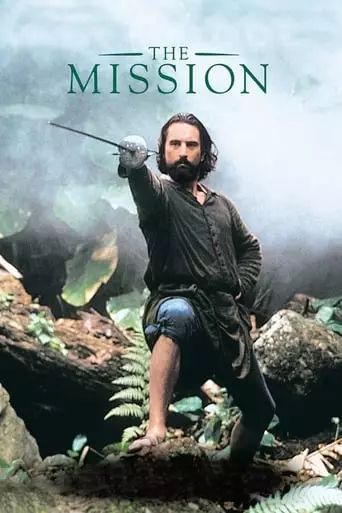
The Mission (1986) Watch Online Free
When a Spanish Jesuit goes into the South American wilderness to build a mission in the hope of converting the Indians of the region, a slave hunter is converted and joins his mission. When Spain sells the colony to Portugal, they are forced to defend all they have built against the Portuguese aggressors.
The Mission (1986), directed by Roland Joffé, is set in the 18th century and revolves around the lives of two key figures—Father Gabriel, a Jesuit missionary, and Rodrigo Mendoza, a former slaver. The film portrays their efforts to protect the Guaraní natives in South America, particularly in the face of colonial pressures from Spanish and Portuguese forces. Father Gabriel, portrayed by Jeremy Irons, is a calm and peaceful priest who seeks to convert and protect the Guaraní people through non-violent means. Meanwhile, Mendoza, played by Robert De Niro, is a man tormented by his past as a slave trader, seeking redemption through his work with the mission.
The plot unfolds around the formation of a Jesuit mission, where Gabriel and Mendoza work together to create a sanctuary for the Guaraní. However, their efforts are disrupted when the Treaty of Madrid in 1750 forces Spain to cede territory to Portugal, putting the mission at risk. Tensions rise as the political machinations of the colonial powers threaten the community’s survival, leading to violent clashes. The climax of the film is marked by a tragic confrontation, where Mendoza and the Guaraní fight against overwhelming odds to defend their mission.
The Mission delves deeply into themes of colonialism, faith, redemption, and sacrifice. The film presents a stark contrast between the spiritual ideals of the Jesuit priests and the ruthless colonialism of the Portuguese and Spanish empires. The question of how to balance moral duty with the harsh realities of the world is explored through the differing approaches of Father Gabriel and Mendoza. Gabriel’s commitment to non-violence, reflecting Christian ideals of peace and forgiveness, is put to the test when faced with violent oppression, while Mendoza’s personal journey of redemption becomes a powerful commentary on the possibility of atonement through action.
Another central theme is the clash between cultures. The Jesuit mission represents an attempt to bridge the gap between European Christianity and indigenous beliefs, yet it is undermined by the greed and political maneuvering of colonial powers. The film’s portrayal of the Guaraní people, their connection to the land, and their fight for survival adds a poignant layer to the narrative, highlighting the destructive impact of European colonialism on indigenous communities.
After watching The Mission, you will likely feel a mixture of awe and sorrow. The beauty of the landscape and the initial harmony between the Jesuits and the Guaraní people may evoke a sense of peace and hope. However, the tragic outcome of the mission will leave you with a heavy heart, as the sheer scale of the injustice inflicted upon the indigenous people is deeply upsetting. The final scenes, with the poignant sacrifice of the missionaries and the Guaraní, may evoke feelings of despair at the forces of colonialism and power that destroy lives.
Despite this, the film also leaves viewers with a sense of inspiration, particularly in the personal redemption story of Mendoza, who finds peace through his actions. The exploration of human sacrifice and the complexities of moral choices may spark introspection, as you consider what you would stand for in the face of oppression. The film ultimately serves as both a sobering reminder of historical injustices and a testament to the enduring power of faith and redemption
